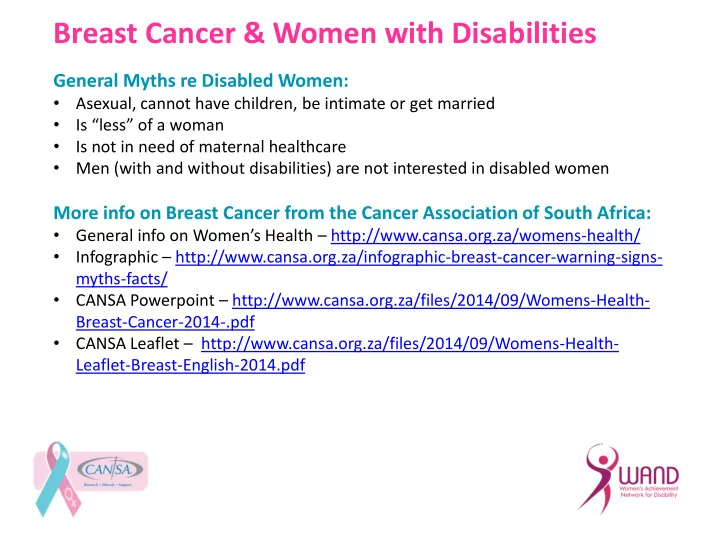

Breast Cancer & Women with Disabilities General Myths re Disabled Women: • Asexual, cannot have children, be intimate or get married • Is “less” of a woman • Is not in need of maternal healthcare • Men (with and without disabilities) are not interested in disabled women More info on Breast Cancer from the Cancer Association of South Africa: • General info on Women’s Health – http://www.cansa.org.za/womens-health/ • Infographic – http://www.cansa.org.za/infographic-breast-cancer-warning-signs- myths-facts/ • CANSA Powerpoint – http://www.cansa.org.za/files/2014/09/Womens-Health- Breast-Cancer-2014-.pdf • CANSA Leaflet – http://www.cansa.org.za/files/2014/09/Womens-Health- Leaflet-Breast-English-2014.pdf
Breast Cancer & Women with Disabilities Some Facts - Disabled Women and Breast Cancer • Women with disabilities experience double barriers, because they are women, who also happen to have a disability • Disabled women are not “exempted” from getting Breast Cancer • The fatality rate is twice as high for women with disabilities than non-disabled women • Breast Cancer is not “less of an issue” than their disability – it is as traumatic for disabled women to receive a diagnosis, as for any woman • Getting a mastectomy is as traumatic for disabled women as for any other woman • Disabled women need emotional support to deal with Breast Cancer , just like other women • Health Care professionals should be able to communicate with disabled women appropriately, e.g. do not give a blind woman brochures to read – rather e-mail documentation - take individual needs into consideration… • Health Care staff should treat disabled women receiving treatment with dignity and respect and in a non-prejudiced manner
Breast Cancer & Women with Disabilities Some Facts - Disabled Women and Breast Cancer • Because disabled women are not specifically targeted during campaigns and information sharing, they often underestimate the importance of breast examinations – so there is a huge risk for late diagnosis of Breast Cancer among disabled women • Health Care Facilities (hospitals, private practices, centres, clinics) are not always easily accessible to disabled women, e.g.: - ramps, bathrooms - lower beds - flexible mammography equipment (can it move up and down) for a disabled woman to sit and have a mammography • Health care staff may not know how to make sure that disabled patients get the Breast Cancer screening they need as they may focus on the disability and not screening for Breast Cancer • Post op rehab can take away any independence that a women with a physical disability had, prior to surgery
Breast Cancer & Women with Disabilities Petra, a Paraplegic Breast Cancer S urvivor’s S tory… “Yes , the diagnosis, the abrupt operation (with absolute no comprehension of what was to come), the treatments, the loss of energy and the grief was a huge challenge”. “But my BIGGEST challenge was none of the above. It was people’ perceptions, words and actions regarding my disability that proved to be the most devastating in the first 18 months after diagnosis ….”
Breast Cancer & Women with Disabilities CANSA Mobile Health Clinics, Breast and Mammography Clinics • CANSA has Mobile Health Clinics that travel to remote areas throughout South Africa to reach people who would otherwise not have access to screening • Our Care Centres do not offer mammograms, but you can contact the following public hospital Breast Clinics http://www.cansa.org.za/files/2014/09/Public- Hospital-Breast-Clinics.pdf • The SA Radiological Society is offering reduced rates on Mammograms during October http://www.cansa.org.za/rssa-offers-reduced-fee-on-mammograms-in- october/
Recommend
More recommend